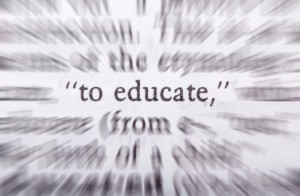 Q: I’ve heard someone say that we should pre-teach to youth when they’re going to encounter tough situations. What is pre-teaching and why does it matter?
Q: I’ve heard someone say that we should pre-teach to youth when they’re going to encounter tough situations. What is pre-teaching and why does it matter?
A: Put simply, pre-teaching is a way of setting young people up for success. Youth can often find themselves in situations that are alien to them or that can cause extreme pressure or stress. If they don’t know how to react appropriately, this can result in them saying or doing something that gets them into trouble.
Pre-teaching therefore helps youth identify the way that they should react, whether that relates to how to stay calm, things to say or whatever else might be deemed appropriate youth behavior, instead of them following their natural instincts.
It’s not possible to use pre-teach everything to young people, as you aren’t going to know every situation they’ll ever find themselves in. There are other times though where you can use pre-teaching to help ensure they don’t get into trouble or avoid getting into further trouble.
Here are some examples of situations where pre-teaching might help, along with suggestions on how to approach it with young people:
1) School Reports – If a young person knows that they’re due to get a bad school report, they might be concerned with how their parents will react. This fear can lead them to become defensive and argumentative when confronted by their parents.
One pre-teaching technique would be to discuss the reasons for the poor report with the young person. Have them identify ways in which they could improve on this the next time round and commit to making these changes, whether that’s through improved behavior in class, handing in their homework on time, etc.
That way, when they have the inevitable discussion with their parents, they can discuss with them how they’ve identified what they didn’t do properly and how they’re going to rectify that. This should help their parents be impressed by their self-reflection and maturity, improving the overall tone of the conversation.
2) Arguments – Perhaps one of your young people has a problem with managing their aggression, resulting in them becoming violent when getting into arguments.
In this situation, pre-teaching would involve working with them to help identify some alternative options they have to break the cycle of resorting to violence. One method is to use the Vicious Cycle aggression management technique. This gets them to look at the different stages of the situation and find ways to control their aggression, deciding when to walk away, etc.
3) Stealing – There are many different reasons why young people choose to steal, so we can’t assume that it’s simply down to greed. Sometimes it’s due to peer pressure, sometimes it’s an outward behavior of internal stress, while for some it’s simply a behavior they’ve learned from their parents.
Whatever the reason behind it, stealing is a behavior that can get young people into serious trouble, both now and later in life. This is therefore an area where pre-teaching can have a positive impact on their future.
One pre-teaching technique would to be run a youth work session on stealing. Here, you help the young people identify for themselves the reason(s) why they steal, how to avoid the temptation to steal, along with the natural and logical consequences of their actions if they don’t stop stealing.
These pre-teaching techniques are actually more like self-pre-teaching, as you’re guiding the young people into teaching themselves the best way to react to situations.
By having young people reflect on these situations for themselves, you’re helping them to internalize the actions they need to take, thereby increasing the likelihood that they’ll make good choices in the future.
There are other occasions in youth work where you might do more of the pre-teaching:
1) Youth Trips – If you’re planning a trip somewhere, it’s important to pre-teach to young people if you have any specific expectations. This pre-teaching could cover things like acceptable language and behavior, what time they should check back in if you’re splitting up into groups, safety advice, etc.
2) Behavior Policy – If you’re setting up a new youth work project, or even if you’re running an existing project, we recommend setting up a youth behavior policy. This sets expectations for your group and pre-teaches the young people as to what is and isn’t appropriate behavior.
3) Youth Worker Leaving – If you or another youth worker who is an important part of your group leaves, this can cause great upheaval for young people. Use pre-teaching to discuss how it’s OK for them to feel sad and to look at appropriate ways for them to react, instead of rebelling against the new youth worker.
Question: How do you use pre-teaching in your youth work? Share your thoughts on best practice in the comments below.
You can also connect with us by:
- Signing up to receive our posts via email
- Following us on Twitter
- Liking us on Facebook
- Signing up to our RSS feed

 Q: I’m working with these aggressive parents who are just angry all the time. The way they speak and act towards me is getting worse. Is there anything I can do?
Q: I’m working with these aggressive parents who are just angry all the time. The way they speak and act towards me is getting worse. Is there anything I can do?
 I don’t believe in anger management.
I don’t believe in anger management.